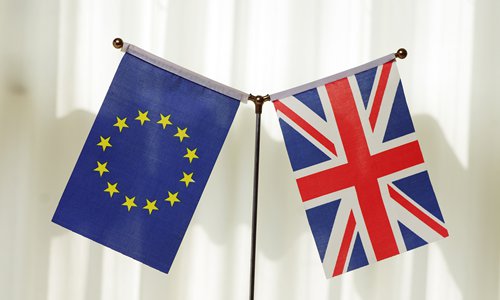HOME >> OPINION
A general election won’t break the Brexit deadlock
By Yuan Jinglin Source:Global Times Published: 2019/9/29 22:48:40

Photo: IC
Endless maneuvering is hurting the political power of Britain, which is endowed with an old capitalist legacy. In early September before parliament was prorogued, British MPs voted to block a no-deal Brexit. This narrows Prime Minister Boris Johnson's options down to leaving with a deal and asking the EU for an Article 50 extension. Though Johnson has said he would "die in a ditch" before seeking an extension, the probability of reaching a deal before the October 31 deadline remains slim as ever. Hence, both sides of the aisle in parliament are hoping a general election would break the deadlock.
But a general election before the end of the year will not put an end to the Brexit crisis. Contrary to the MPs' hopes, it would create more problems on top of Brexit, as a likely hung parliament would leave the UK without a government for some time.
Latest polls show that a hung parliament with the Conservatives being the largest party is the most likely outcome of a general election. However, it would fall short of a majority, and possibly end up with fewer seats. The government would still not have a mandate in parliament, making the time and effort that went into the campaign pointless.
That does not mean a general election would bring much good news to the opposition parties either. The Conservatives are expected to win back most of the seats of the 21 MPs who were expelled for voting against no-deal Brexit. And the three largest opposition parties are not likely to combine for more than the 326 seats required for a majority. Even if they were to form a three-way coalition — unheard of in British politics — they would still need more parties onboard. A tall task if they want to be in power.
To make an anti-Conservative coalition even less likely, the three parties would clash on major policies, and never agree to a coalition in the first place. The Scottish National Party's whole agenda is to make Scotland independent from the UK, something both Labour and the Liberal Democrats are firmly against. And while the Liberal Democrats and the Scottish National Party are pro-Remain, Labour leader Jeremy Corbyn has yet to voice his opinion on Brexit. This has raised doubts on whether he would be fit to lead a pro-Remain government. Consequently, Liberal Democrats leader Jo Swinson has announced she would not support a Corbyn-led government.
The polls are also predicting a trend away from Conservatives and Labour, the two largest parties. In the last election, the two parties received 86 percent of the total votes. This number would slide to 57 percent in the upcoming one, as the polls suggest. It would mean a decrease in seats for the two largest parties. As power starts to shift away from the two major parties, passing legislations in parliament would become more difficult.
Let the two large parties' fall from grace be an indication of the public losing trust in them over Brexit. However, fiercely they may campaign against each other in the coming months, neither is likely to reach a clear majority after the election. And when a new UK government is finally formed after six weeks of campaigning and exhausted MPs return from endless rounds of negotiations, they will look around parliament, only to find nothing has changed.
Brexit has been changed from whether it should divorce the EU to a question of whether it has the political ability to find a way out of the maze. Britain is the pioneer of the modern capitalist political system. Its political mechanism, which goes back 800 years, has begun to enter a vicious circle of self-torture. The political drag caused by it is of course not only for the UK, but for the whole of Europe, and even hurts the expansion of Western civilization.
The author a watcher of British politics based in the US. opinion@globaltimes.com.cn
RELATED ARTICLES:
Posted in: VIEWPOINT